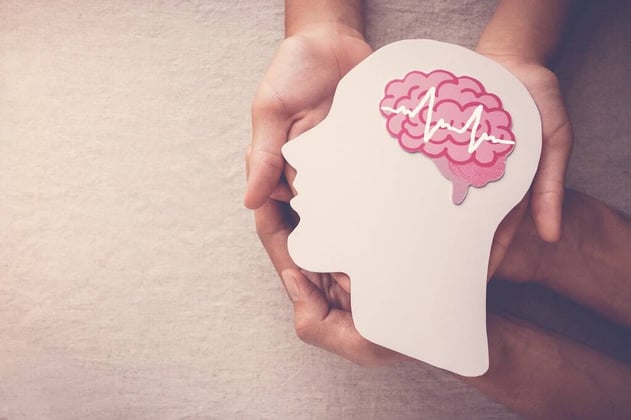
Did you know that occupational therapy originated in the mental health setting? The profession developed from the mental hygiene movement of the early 20th century. The first occupational therapists worked with American soldiers who came back home “shell shocked” after World War I, teaching them crafts and vocational skills that would improve their morale. From there, occupational therapy continued into community health centers after the deinstitutionalization movement in the mid-20th century. In fact, most occupational therapists once worked in mental health. That number has decreased over the years, but new opportunities are arising with recent changes in the mental health field.
Mental illness is the leading cause of disability in the world. According to the World Health Organization, these are defined as “illnesses characterized by abnormal thoughts, perceptions, emotions, behavior, and relationships with others.” People may be diagnosed with depression, bipolar disorder, schizophrenia and other psychoses, dementia, as well as developmental disorders including autism (WHO). These illnesses can be debilitating and lead people to struggle with the normal activities of daily life. They can also cause significant disruption to a patient’s life and the return to a “normal life” may take a deliberate process of recovery.
The World Health Organization defines these major mental health conditions:
Depression: A common mental health condition characterized by “sadness, loss of interest or pleasure, feelings of guilt or low self-worth, disturbed sleep or appetite, tiredness, and poor concentration.”
Bipolar Disorder: A mental health condition characterized by alternating elevated moods, with an inflated sense of self-esteem, and depressed moods.
Schizophrenia and other psychoses: Severe mental health disorders resulting in “distortions in thinking, perception, emotions, language, sense of self and behavior.”
Dementia: A mental health condition affecting older people that leads to a deterioration of cognition beyond what is normal for aging.
Developmental disorders including autism: Intellectual disability and pervasive developmental orders that impair cognitive function, behavior, language, and communication.
Doctors may first prescribe medication and talk therapy to patients with mental illnesses. However, medication and talk therapy may not address the significant changes to the patient’s life that their mental illness may have brought about. That’s where the benefits of occupational therapy come in.
Today, occupational therapy is more widely practiced in rehabilitation and pediatric settings, but it’s still present in mental health recovery. The Substance Abuse and Mental Health Administration (SAMHSA) defines recovery as “a process of change through which individuals improve their health and wellness, live a self-directed life, and strive to reach their full potential.” Occupational therapy in the mental health setting is a collaborative effort between the client and the practitioner. Occupational therapists teach clients useful skills and strategies that can assist them on the road to recovery.
Occupational therapists will first seek to understand the activities that the client needs to do in addition to the activities that are most meaningful to them. It’s a holistic therapy that considers not only the health and wellness of the patient, but also the “occupations” that enable them to participate fully in life, including education, work, social activities, and leisure. Occupational therapy also focuses on instilling hope, motivation, and empowerment in clients, as well as helping them build resilience. OT can lead to lasting benefits for patients who are recovering from mental health issues.
Mental illness can be an extremely devastating medical condition. Not only can the symptoms lead to challenges in the activities of daily life, patients who suffer from mental illness often lose motivation and a sense of self-esteem. They often isolate themselves. The illness can be painful, something they suffered for an extended period of time, and that has profoundly disrupted their lives. Depression, for example, causes people to lose energy and motivation, which in turn can make them isolated. The isolation may lead to further negative thoughts and exacerbate their depression. An illness such as schizophrenia can lead to a significant deviation from the lives of the people around them, causing them to drop out of school, stop working, and potentially become ostracized from society.
Yet as many occupational therapists might explain, the need to do things is an essential part of being human. People do things that are necessary, and they do things because they want to do them. These are called the “occupations.” People who are suffering from depression may need help from a professional to regain the ability and motivation to participate in many activities. Occupational therapists work with patients to build skills and adapt their environment in ways that make it easier for them to do the things they both need and want, helping patients regain a sense of accomplishment and pleasure from taking action to help themselves.
When working with mental health clients, occupational therapists may carry out the following interventions:
- Teaching clients the skills of living independently
- Teaching interpersonal and social skills
- Educating clients on stress management
- Educating clients on assertiveness
- Educating clients on hygiene
- Collaborating with clients on career choices
- Collaborating with clients on job placement and career skills
- Helping clients develop and accomplish leisure activities
- Providing cognitive behavioral therapy to help clients think more realistically
- Providing cognitive rehabilitation to address cognitive deficits
Occupational therapy can be an important part of a holistic program to treat mental illness. OTs collaborate with psychiatrists, therapists, social workers, and families to guide their clients along the journey to recovery. During treatment, they will communicate with the other healthcare workers in the program regarding how other aspects of the treatment are affecting the client’s ability to participate in the activities of daily life. They might observe and document whether a change in medication is creating more side effects than expected or whether the program is helping the client improve in cognitive ability, concentration, and morale.
At Rehab Select, occupational therapists work with the other members of the treatment to gain a detailed picture of the patient as a whole person. Throughout the course of treatment, each of the disciplines will meet weekly to discuss each patient and their progress, sharing ideas, observations, and strategies that help move the treatment plan forward. Learn more about Rehab Select’s occupational therapy program by scheduling a tour.




